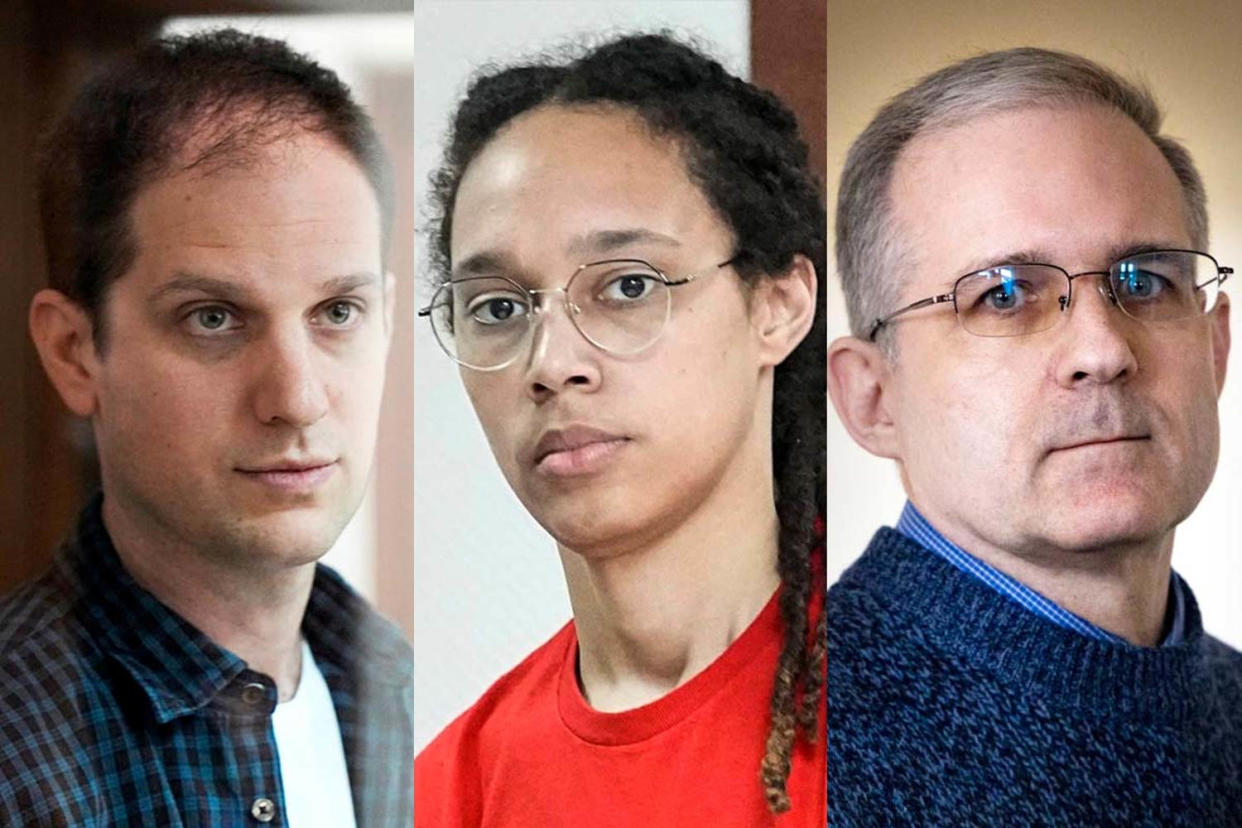How the Russian prisoner swap that freed Evan Gershkovich unfolded over two years
It was a tale of two families when the negotiations that resulted in the release of Wall Street Journal reporter Evan Gershkovich and three other U.S. residents from Russian captivity Thursday got underway nearly two years ago.
WNBA star Brittney Griner, who had been jailed on drug charges, was heading home in December 2022 to her relieved wife and kin after the Biden administration worked out a deal with the Russians to exchange her for the notorious arms dealer Viktor Bout, aka “The Merchant of Death.”
Meanwhile, Paul Whelan’ family was in anguish after it learned that the release of Whelan, a former Marine who had been falsely accused of espionage and had by that point served two years of a 16-year sentence in a grim Russian prison, was not part of that deal.

They soon learned, sources told NBC News, that the Biden administration was already seeking to exchange other Russian prisoners in U.S. custody for Whelan and other captive Americans.“Through many difficult conversations over the past several years, I told the families of those wrongfully detained in Russia that we would not forget them,” Secretary of State Antony Blinken said Thursday. “I know there are many times over those years where they have wondered if our work would ever bear fruit. But I also know that they never gave up hope, and neither did we.”
Blinken was the first official to float the idea of another possible prisoner swap after Griner’s release to his Russian counterpart, Sergei Lavrov.
The effort took on extra urgency in March 2023, when the Russians arrested Gershkovich, a senior administration official said.
Blinken told Lavrov that Gershkovich is a journalist who works for an internationally respected news outlet and that “claims that he was spying are outrageous and false. Your government has crossed a line.”
Lavrov insisted Gershkovich was “caught red-handed” and added, “Him being a journalist does not provide him immunity.”
Blinken, according to the officials, replied: “You know our country well. You know your system well. We are both adults. You know that for all our efforts to learn information, we do not use journalists.”
Gershkovich and The Wall Street Journal have repeatedly denied he was engaging in espionage.
In the months that followed that exchange, evidence emerged that a serious effort to get the captured Americans out of Russia was underway.
In February, the Russians revealed that imprisoned opposition leader Alexei Navalny had died. Days later, NBC News reported that a deal that could have sprung Navalny, Gershkovich and Whelan had been in the works.
With Navalny now out of the picture, new negotiations that would result in one of the biggest prisoner exchanges since the Cold War began in earnest. It was an effort that required the cooperation and willingness of U.S. allies Poland, Slovenia and Norway to release the four Russians they were holding to help secure the release of the four American residents.
Early on, the sticking point was in Berlin.
Moscow was keen on securing the release of hitman Vadim Krasikov, who was serving a life sentence in Germany for the 2019 murder of Zelimkhan Khangoshvili, a former Chechen separatist, in what prosecutors believed was a Russian state-sanctioned assassination.
But German Chancellor Olaf Scholz had refused to let Krasikov go when the U.S. was negotiating the release of Griner and Whalen. And he once more said no when the U.S. asked again last year in a second bid to free Whalen.
The breakthrough with Berlin came this January, when President Joe Biden called Scholz and invited him to the White House to discuss a prisoner swap with Russia that would include Navalny.
After Biden and Scholz met on Feb. 9, Scholz told Biden he was on board.
Vice President Kamala Harris also discussed the prisoner swap with Scholz, telling him that Krasikov was a critical component of getting a prisoner swap with Russia, a White House official said.
"She moved the ball forward significantly in that meeting," the official said.
But after Navalny died, the White House had to come up with a Plan B that involved exchanging Krasikov for several German nationals who were being held as political prisoners in Russia.
In April, Biden sent a letter to Scholz that spelled out the details of the offer. By June, Germany was on board with it, and the offer was presented to the Russians, who agreed in principle on July 17, an administration official said.
That was the day Biden tested positive for Covid in Nevada and two days before Gershkovich was sentenced to 16 years in prison for espionage.
But even with the Russian OK, it was a pitch-in-progress that did not come together until about an hour before Biden announced on July 21 that he was ending his run for re-election. That was when he called the Slovenian prime minister to make sure his country was ready to release the Russian in their custody.
On Tuesday, national security adviser Jake Sullivan called Whelan’s sister, Elizabeth Whelan, and Gershkovich’s parents and invited them to come to the White House on Thursday.
The next day, Sullivan extended the same invitation to family members of American captives Vladimir Kara-Murza and Alsu Kurmasheva.
Sullivan did not spell out why they were being asked to come, but the reason was apparent, a senior administration official said.
Once the American captives were in U.S. hands, Biden and their relieved relatives stepped before the cameras for a televised address from the White House.
“Now, their brutal ordeal is over and they’re free,” Biden said. “This is an incredible relief for all the family members gathered here. It’s relief to the friends and colleagues all across the country who have been praying for this day for a long time.”






